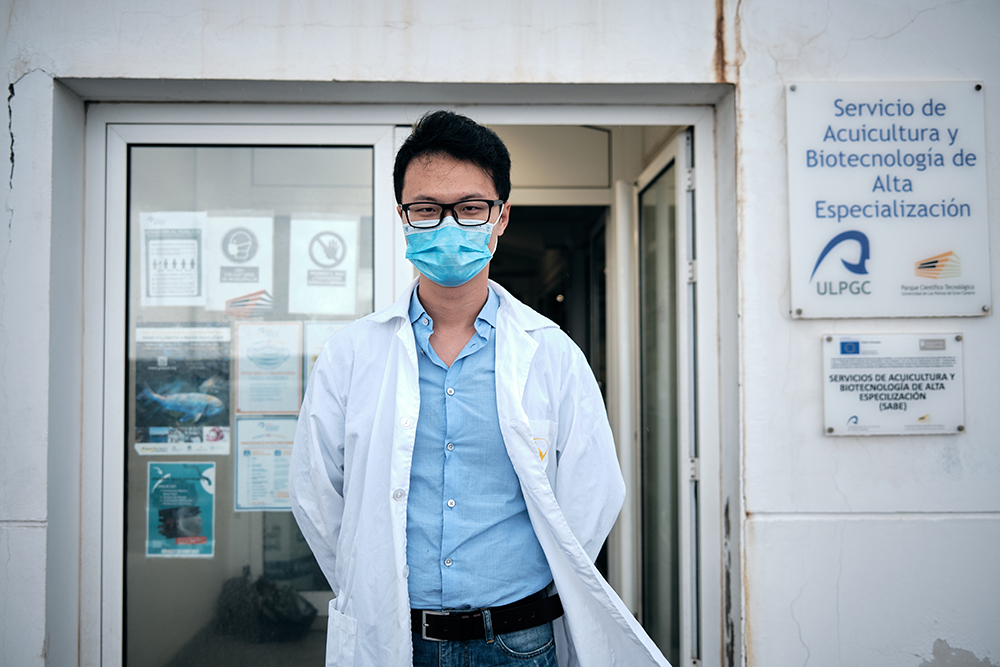The research, which was presented on 2nd of February and watched by around thirty people through OpenULPGC, has been presented by the Chinese student Hanlin Xu, supervised by the directors of the University Institute of Sustainable Aquaculture and Marine Ecosystems (ECOAQUA) of the University of Las Palmas de Gran Canaria (ULPGC), Prof. Marisol Izquierdo, and Prof. Juan Manuel Afonso, head of the Aquaculture Research Group of the mentioned university institute.
As a result of this thesis, the Chinese researcher has managed to provide genetic and epigenetic information on the process of transmission of this information to the offspring of sea bream. This finding may help to understand how these mechanisms originate and function in other animal species and even in human.
The thesis, included in the PerformFish project of the Aquaculture Research Group of the University Institute of Sustainable Aquaculture and Marine Ecosystems (ECOAQUA) of the University of Las Palmas de Gran Canaria (ULPGC) and entitled "Nutritional programming of gilthead sea bream (Sparus aurata) through the diet of broodstock for a better use of diets low in fishmeal and fish oils in the offspring", obtained a grade of outstanding cum laude within the specialty of International Doctorate.
His results reveal that the gene and diet of the parents of this fish have a key influence on the metabolism, feeding and growth of their offspring.
The research carried out by the ULPGC doctoral student, Hanlin Xu from China, has achieved important findings such as obtaining genetic and epigenetic information, including discovering that the expression of microRNAs and methylation of DNA (the main epigenetic mechanism in developmental biology that involves the addition of methyl sites to nucleotides), which are key factors in the growth of the fish. Both of them are main means of information transmission from parents to offspring in sea bream. This discovery that could be very useful to know how these processes occur in other species such as, for example, humans.
This work, therefore, demonstrates the enormous effect that the way of breeding fish on the development of their offspring, not only at birth but throughout their lives, a circumstance that in biology is known as nutritional programming, a process that has also been studied in humans.
According to the director of this thesis, Marisol Izquierdo, main responsible of the University Institute ECOAQUA, in human the nutritional programming "began to be known at the end of the 70's through an investigation on the Dutch famine that took place in the winter between 1944 and 1945 in which the German troops, in the middle of World War II, exercised a very important control in the borders that was translated in the population in a drastic decrease of the caloric ingestion in about 580 calories a day when a human being, depending on his condition, needs between 2. 200 to 2,900 calories a day".
This famine had a profound effect on pregnant women between the third and sixth month of gestation of their offspring, a circumstance that caused the very hungry sons and daughters of these mothers to "adapt their metabolism through nutritional programming to the food shortage."
Through studies of the Dutch famine, it was shown that, of this genetic transmission by nutritional programming, the descendants of those mothers who went hungry used the food they consumed more efficiently and profitably.
Those sons and daughters," Izquierdo assures us, "however, began to develop the metabolic syndrome 30 years after those events, which generated metabolic disorders such as obesity, altered lipid profiles and others related to the incidence of cardiovascular diseases, etc. From that moment on, it began to be discovered how the diet of people, of mothers in this case, but perhaps also of fathers as has been seen in fish, can affect the metabolism of the offspring "since it was adapted to famine but not to periods of excessive feeding as happened in the 1980s," says Professor Marisol Izquierdo.
"We use fish as a model that allows us to obtain basic information on how these changes occur at the genetic or metabolic level and what mechanisms act on them. This is very important information that we will later see how it can be applied to understand the processes that occur in humans. In fact, some research groups are joint and are formed by human nutritionists in collaboration with fish nutrition groups in different countries," Izquierdo concludes.
The studies of Xu, a biotechnology engineer, have also shown that the selection of broodstock with a high expression of a key gene, fads2, leads to progeny with a higher growth capacity.
This research, in addition to a better understanding of the epigenetic mechanisms associated with nutritional programming in humans, yields result of great relevance in the production of fish in aquaculture, providing knowledge for the feeding and selection of farmed fish and contributing to generate fish with a higher content of omega-3, important for human health.
The tribunal in charge of evaluating this international thesis was formed by María Jesús Zamorano, professor at the Faculty of Veterinary Medicine of the ULPGC, by Bente Ruyter, professor at the Norwegian University of Life Sciences and Researcher at the Norwegian Institute of Food, Fisheries, and Aquaculture Research, and by Ana Farías, professor at the Universidad Austral de Chile and director of the Aquaculture Research Institute of this Chilean university.
Xu learned in 2015, as a visiting scientist, about the work of IU-ECOAQUA at an International conference in Wuhan, where its director, Marisol Izquierdo, gave the opening lecture, then applied for admission to the ULPGC PhD program. He arrived at the ECOAQUA University Institute at the end of 2016, on a scholarship from the China Scholarship Council and enrolled in the ACUISEMAR PhD program. Throughout these years, he has made seven publications and about ten presentations at national and international conferences. In 2019, he received the second prize for the best research paper presented by a PhD student at the European Aquaculture Society Annual Congress.


